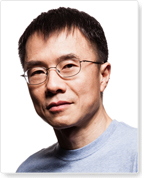
Prof. Christos Faloutsos
from Carnegie Mellon University
Title:
Large Graph Mining: Patterns, Cascades, Fraud Detection, and Algorithms
• Date: Wednesday, April 9, 2014
• Place: Grand Ballroom (1F)
• Time: 9:30~10:30
• Session Chair: Torsten Suel (New York University)
- Abstract:
-
Given a large graph, like who-calls-whom, or who-likes-whom, what behavior is normal and what should be surprising, possibly due to fraudulent activity? How do graphs evolve over time? How does influence/news/viruses propagate, over time? We focus on three topics: (a) anomaly detection in large static graphs (b) patterns and anomalies in large time-evolving graphs and (c) cascades and immunization.
For the first, we present a list of static and temporal laws, including advances patterns like ‘eigenspokes’; we show how to use them to spot suspicious activities, in on-line buyer-and-seller settings, in FaceBook, in twitter-like networks. For the second, we show how to handle time-evolving graphs as tensors, how to handle large tensors in map-reduce environments, as well as some discoveries such settings.
For the third, we show that for virus propagation, a single number is enough to characterize the connectivity of graph, and thus we show how to do efficient immunization for almost any type of virus (SIS – no immunity; SIR – lifetime immunity; etc)
We conclude with some open research questions for graph mining. - Biography:
-
Christos Faloutsos is a Professor at Carnegie Mellon University. He has received the Presidential Young Investigator Award by the National Science Foundation (1989), the Research Contributions Award in ICDM 2006, the SIGKDD Innovations Award (2010), nineteen “best paper” awards (including two “test of time” awards), and four teaching awards. He is an ACM Fellow, he has served as a member of the executive committee of SIGKDD; he has published over 200 refereed articles, 11 book chapters and one monograph. He holds six patents and he has given over 30 tutorials and over 10 invited distinguished lectures.
His research interests include data mining for graphs and streams, fractals, database performance, and indexing for multimedia and bio-informatics data.

Dr. Jong-Deok Choi
from Samsung Electronics and Samsung’s Software R&D Center (SWC)
Title:
Taming the Web
• Date: Thursday, April 10, 2014
• Place: Grand Ballroom (1F)
• Time: 9:00~10:00
• Session Chair: Kyuseok Shim (Seoul National University)
- Abstract:
-
The World Wide Web (WWW) has become an indispensable part of the modern life, providing many benefits in diverse ways. For instance, the huge amount of information from the web offers people unprecedented levels of opportunities for education, entertainments, social activities, productivity improvements, and business. The web, however, has also become perilous with many dangers, such as privacy violation and security breaches, and therein exist many villains who would like to turn into victims scrupulous as well as casual users. In this regard, WWW has become almost like Wild Wild West, where wonderful opportunities and great perils co-existed.
Tizen (www.tizen.org) is a web-centric open-source, standards-based software platform for smart devices, such as smartphones, smart TVs, IVI (In-Vehicle Infotainment) and other consumer devices like cameras, printers, and more. Tizen is web-centric in that it directly supports web apps – applications (apps) written in HTML5 and Javascript – even outside the web-browsers and provides seamless supports for the web. As such, Tizen not only shares the benefits and perils of the web with other platforms, but also has the additional burden to meet the performance of non-web platforms: platforms that directly support only conventional programming languages. In this talk, we present Tizen approaches to taming the web to maximize its benefits while minimizing the risks of its perils. We also describe various optimizations of Tizen that enable delivering web-app performance on par with that of non-web platforms.
- Biography:
-
Dr. Jong-Deok Choi from Samsung Electronics and Samsung’s Software R&D Center (SWC)
Dr. Jong-Deok Choi is an Executive Vice President at Samsung Electronics, and manages Samsung’s Software R&D Center (SWC) as its Deputy Head.
From December 2011 to December 2013, he was Head of Software Platform Team of SWC, leading the development of the Tizen Open Source Platform for smart devices, such as smart phones, tablets, IVI (In-Vehicle Infotainment), Digital TV, etc (www.tizen.org). He is a Co-Chair of the Tizen’s Technical Steering Group.
Before joining Samsung Electronics, he worked at IBM T. J. Watson Research Center, as a Research Staff Member and Manager. One of the groups he managed at Watson was the High Performance Software Environments group, working on optimizing Web Services.
Dr. Choi is an expert on optimization technologies for Java, C/C++, Javascript and other programming languages; optimizing Web Services; and programming tools for distributed and parallel systems. He was a key contributor to the PTRAN parallelizing-compiler project and the JikesRVM open-source Java virtual machine (JVM), both at IBM Research.
Dr. Choi has published over 60 technical papers, and holds 25 US patents, on subjects such as interprocedural dataflow analysis, pointer analysis, escape analysis of threads, and datarace detection.

Dr. Qi Lu
from Microsoft
Title:
Organizing the Digital World to Empower People to Do More, Know More, and Be More
• Date: Friday, April 11, 2014
• Place: Grand Ballroom (1F)
• Time: 9:00~10:00
• Session Chair: Andrei Broder (Google Inc.)
- Abstract:
-
The web is rapidly evolving into the web of the world where people, places, things and their relationships are all digitally represented. This evolution opens up unparalleled opportunities to organize this vast digital universe for even greater human purpose. In this talk, Dr. Lu will share an outline of Microsoft’s quest and aspiration to organize the digital universe with a pervasive computational fabric of digital information, digital services, and digital experiences that empower every human being on the planet to accomplish more and enrich their life. Dr. Lu will discuss high level computational structures and present specific examples across Bing, Windows and other products and services to illustrate Microsoft’s approach to delivering end user value and accelerating the pace of innovation for the industry as a whole.
- Biography:
-
As executive vice president of Microsoft’s Applications and Services Group, Dr. Qi Lu leads Microsoft’s business across productivity, communications, search and other information services. He sets the vision, strategy, and overall direction of the Applications and Services group, and is responsible for all of the research and development teams across Microsoft Office, Office 365, SharePoint, Exchange, Yammer, Lync, Skype, Bing, Bing Apps, MSN and the Advertising platforms and business group. The Apps and Services group will empower people and organizations around the world to ‘Get More Done’ with compelling and delightful experiences. Until recently, Dr. Lu was the president of the Online Services Division, where he led the company’s search, portal and online advertising efforts.
Prior to joining Microsoft, Dr. Lu spent 10 years as a Yahoo! senior executive. His roles included serving as the executive vice president of engineering for the company’s Search and Advertising Technology Group where he oversaw the development of Yahoo!’s Web search and monetization platforms, and vice president of engineering responsible for the technology development of Yahoo!’s search, e-commerce and local listings of businesses and products.
Before joining Yahoo!, Dr. Lu worked as a research staff member at IBM’s Almaden Research Center and Carnegie Mellon University, and was a faculty member at Fudan University in China. He earned his bachelor’s and master’s degrees in computer science from Fudan University and his Ph.D. in computer science from Carnegie Mellon University. Dr. Lu holds 20 U.S. patents.




